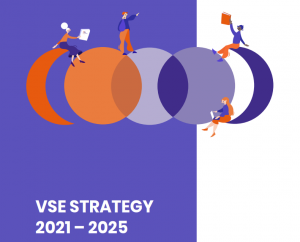Victim Support Europe’s vision is to have a Europe in a world where the needs of all victims of crime are fully met through effective rights and high quality services. To achieve this vision, our mission is to drive change on victims’ issues and support of the delivery of victims’ services whilst operating sustainably and growing our capability.
Towards the near future, in 2021 to 2025, VSE will therefore promote the following strategic priorities:
- Promote implementation and strengthening of victims’ rights
- Ensure victims are recognised, treated with respect and protected from secondary victimisation
- Promote the rights, resilience and recovery of victims, and strengthen victim support
- Facilitate full access to support for victims within a national framework
- Work towards victim-centred justice and compensation systems
- Grow and strengthen VSE
The theme of this year’s European Day for Victims of Crime and of the VSE Action Week 2022 focuses on safe justice for victims throughout the criminal justice proceedings. This resonates with the fifth strategic priority for VSE in the upcoming years. Accessing safe justice systems remains a fundamental problem for victims. Not only do many victims never enter the justice system, but for many the experience is unnecessarily traumatic. There are many examples of rules and actions which are harmful to victims, as well as jurisdictions which follow more victim centric approaches.
VSE will spend the coming years improving its knowledge on what works best, understanding where countries are failing or succeeding, and promoting improvements in justice systems.
We want to achieve victim centred justice systems by:
Pursuing full implementation of measures to protect victims from secondary victimisation in criminal proceedings – focusing both on behaviours, rules and infrastructure
As reflected in work to ensure implementation of EU laws, VSE will prioritise actions to fully understand the victim’s experience within criminal proceedings, identifying in what ways victims experience secondary victimisation and what the causes and drivers of those negative experiences are. Research will be carried out to determine existing and new practices which could mitigate problems. VSE will use this knowledge to develop clear recommendations for change based around a model vision of victim centric justice systems.
As part of our advocacy work, we will also examine whether existing EU legislation is sufficient in scope and detail to support mitigation of secondary victimisation and if not we will promote changes to laws. Whilst international advocacy can make an important impact across a wide region, VSE will also work to influence change at the national level in partnership with Members. This will in particular be through the support of Members’ advocacy efforts as well as capacity building and justice focused projects – working collaboratively with governments and practitioners. This will include new methods of supporting victims in their testimonies e.g. through facility dogs, and exploring how new technologies can be used for the benefit of victims.
Promoting the implementation of international best practices on protection measures for victims
Currently there are wide ranging approaches to protection measures – both in terms of the types of measures that exist as well as how those measures can be adopted. The variety of measures results in greater or lesser protection for victims depending on which country they are in. Simply put, this can cost lives. VSE will work to ensure that in the EU at least, there is some level of harmonisation on the existence and application of protection measures, in line with best practices.
The EU has already raised the point thanks to VSE lobbying. VSE will next start to gather evidence of the ways in which different kinds of victims (though often gender based violence victims) require protection and what systems work best. VSE will promote the adoption of EU legislation based on this evidence and the greatest priorities for victims.
Promoting and facilitating victims’ central role in criminal proceedings
For many victims the possibility and ability to participate in criminal proceedings is crucial. Different states permit different roles for victims within proceedings providing them with greater or fewer participatory rights. At the same time, even where rights to participation do exist these may be limited due to lack of information, insufficient support within the process, or poor procedures which discourage participation, overburden victims or cause them harm.
As part of VSE’s overarching objective to advocate for safe justice systems where fair trial and procedural justice apply fully to victims, VSE will seek to determine what are the most effective means of support full participation of victims within criminal proceedings – within the constraints of their existing legal role. VSE will also begin examine whether the role of victims should and could be expanded in European states.
Developing stronger victims’ rights in non-criminal judicial proceedings – civil, administrative etc.
VSE has so far not advocated with respect to the rights of victims of crime in non-criminal proceedings – except with respect to state compensation. However, different groups of victims often have to go to civil or administrative courts in relation to issues arising from the crime they have suffered for example divorce or custody proceedings.
At present, it appears there are few similar protections for victims in these proceedings compared to criminal proceedings. VSE will therefore start to explore the issues to determine if and what might be the most urgent advocacy and change priorities. Depending on findings VSE will begin to advocate for specific changes in proceedings, or will carry out further research in preparation of the next five year period.
You can find VSE Strategy 2021 – 2025 here.


